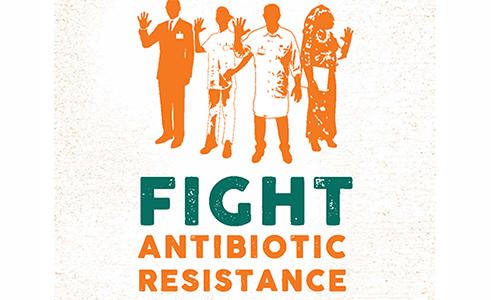
Antimicrobial resistance (AMR) is a major threat to health and human development, affecting our ability to treat a range of infections. Treatments for a growing number of health care-associated infections (HAI) have become less effective in many parts of the world due to increasing incidence of infections becoming resistant to antimicrobials. However, a large proportion of these infections can be easily prevented by implementing infection prevention and control (IPC) measures.
Language: English
Health topic
Course information
Overview
In this course, you will learn about what AMR is and how resistant infections occur, which pathogens cause the biggest problems globally and in the health care setting, the risk factors and causes of AMR and, most importantly, the role of IPC in reducing AMR. You will learn about strategies to reduce and prevent the occurrence of antibiotic resistance. These strategies include infection prevention and control (IPC), such as observing proper hand hygiene and environmental cleaning; triaging and isolating/cohorting patients with infections that are antibiotic-resistant; practicing antimicrobial stewardship; and conducting surveillance. You will also learn about how to use the World Health Organization’s (WHO) multimodal strategies to implement activities to reduce and prevent AMR.
Learning Objectives
By the end of this course you will:
- describe the mechanisms of antibiotic resistance;
- list important antibiotic-resistant bacteria, including Gram-positive and Gram-negative bacteria, and note key differences;
- explain why the spread of antibiotic resistance is a major threat in all health care facilities worldwide, and why urgent action is needed;
- explain factors contributing to the emergence and spread of antibiotic-resistant bacteria between health care facilities and communities.
Course duration: Approximately 3 hours.
Certificates: A Record of Achievement will be issued to participants who receive at least 70% on the post-test. You have an unlimited number of attempts to meet the threshold. Participants who receive a Record of Achievement can also download an Open Badge for this course. Click here to learn how.
Course contents
Antimicrobial Resistance (AMR) Overview:
Antimicrobial resistance (AMR) is a major threat to health and human development, affecting our ability to treat a range of infections. Treatments for a growing number of health care-associated infections (HAI) have become less effective in many parts of the world due to increasing incidence of infections becoming resistant to antimicrobials. However, a large proportion of these infections can be easily prevented by implementing infection prevention and control (IPC) measures. In this module, you will learn about what AMR is and how resistant infections occur, which pathogens cause the biggest problems globally and in the health care setting, the risk factors and causes of AMR and, most importantly, the role of IPC in reducing AMR.Strategies for Overcoming Antibiotic Resistance:
In this module, you will learn about strategies to reduce and prevent the occurrence of antibiotic resistance. These strategies include infection prevention and control (IPC), such as observing proper hand hygiene and environmental cleaning; triaging and isolating/cohorting patients with infections that are antibiotic-resistant; practicing antimicrobial stewardship; and conducting surveillance. You will also learn about how to use the World Health Organization’s (WHO) multimodal strategies to implement activities to reduce and prevent AMR.
Enroll me for this course
Certificate Requirements
- Gain a Record of Achievement by earning at least 70% of the maximum number of points from all graded assignments.
- Gain an Open Badge by completing the course.